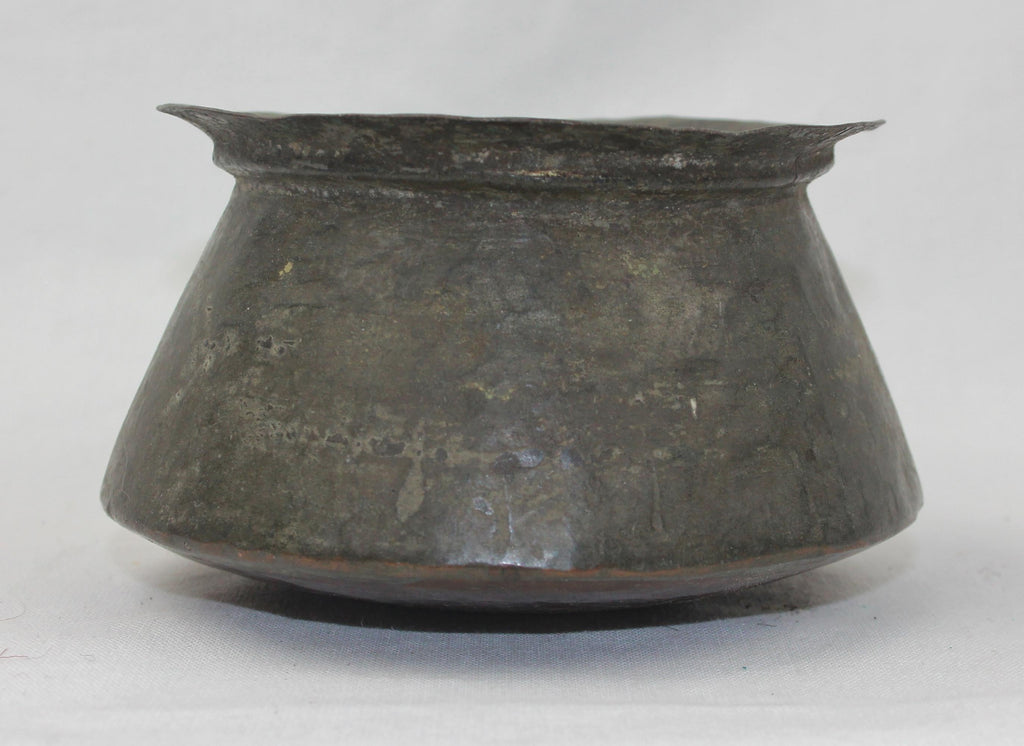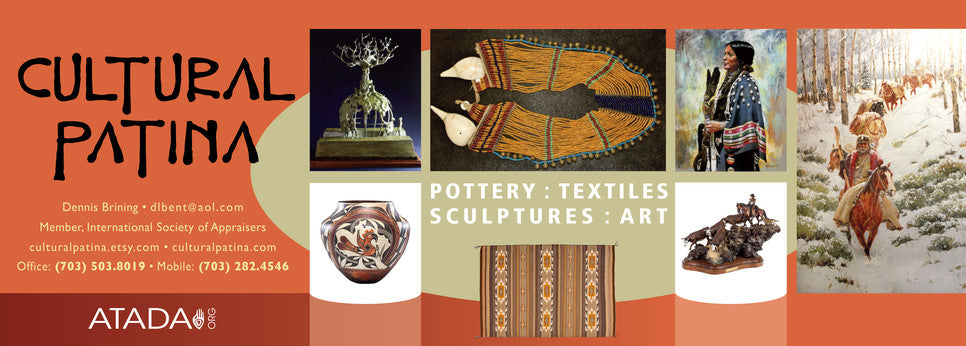
Small Historic Hand Formed Omani Bedouin Copper Cooking Pot, Ca Early 1900's, #1514
$ 300.00
Small Historic Hand Formed Omani Bedouin Copper Cooking Pot, Ca Early 1900's, #1514
Description: #1514 Small Historic Hand Formed Omani Bedouin Copper Cooking Pot, Ca Early 1900's, Collected in Muscat some 45 years ago while on business to the area from an Omani Bedouin first hand. The piece is in excellent condition given its age. These were approximately 70-80 years old when I purchased them so they have seen a good bit of history. This piece has a heavy patina on it from the years witnessed over time. An incredible piece of history. If it could speak, it would fill volumes.
Dimensions: 2" x 4.5"
Condition: Excellent for age, great patina from years of use.
Bedouin of Oman & the Culture of Oman
The Omani culture has its roots firmly in the Islamic religion. Oman developed its own particular form of Islam, called Ibadhism, after its founder, Abdullah ibn Ibadh who lived during the 7th century AD. Not all Omanis are Ibadhis however; there are also Sunni and Shi'a Muslims. Omanis are not only tolerant of the beliefs of different Muslim sects, they are also tolerant towards believers of other faiths, who are allowed to practice their religion in churches and temples.
Oman has a very long history and was known as Magan to ancient Persian and Mesopotamian civilizations and was an important producer of copper and ornamental stone. The Arab tribes in Oman adopted Islam during the lifetime of the prophet Muhammad (c.570–632) and forced the Persian colonizers to leave. Since then, Oman has generally remained an independent Arab and Ibadi/Sunni Muslim entity.
The Omani national identity has evolved from its predominant Arab language and culture, its tribal organization, and Islam. Oman withstood attempts by classical Islamic empires to subdue the country, and the Portuguese invasion of the sixteenth century was confined to coastal ports and was terminated by national Omani resistance in the mid-seventeenth century.
Najdi Bedouin of Oman
The traditional homeland of the Bedouin Arab is the Arabian Desert; however, some Bedouin groups have migrated north into the Negev Desert region. Jordan was one of the first lands to be inhabited by the Bedouin, and today many Bedouin still live there, primarily raising sheep and goats.
The Bedouin fall into two basic social classes. One class is known as the "true" Bedouin, and they live as nomadic shepherds. The other group has embraced farming and is known as the fellahin. The fellahin lead a more settled life on the edge of the desert. In contrast, the "true" Bedouin have been known for raiding any caravans that cross their paths while journeying across barren deserts. They move into the desert during the rainy winter seasons and back to the desert's edge during the hot, dry summers. They speak Badawi, or as it is more commonly called, Bedouin Arabic.
The Bedouin Arabs have a relatively harsh existence. The nomads have no permanent homes, but live in portable, black tents made from woven, goat hair. The tents are divided by a decorative partition called a gata. Half of the tent is for the women, children, cooking utensils, and storage. The other half contains a fireplace and is used for entertaining. The women do most of the work, while the men socialize and make plans for the group. The material culture of the Bedouin is limited. Their tents are their main possessions, and animals are very important for their nomadic lifestyle. Camels are their main means of transportation, while sheep and goats are bought and sold. To endure the extreme heat of the desert, the Bedouin wear lightweight, light-colored clothing. It is very loose-fitting, allowing for the circulation of air.
Dairy products are the main food source for the Bedouin. Milk from camels and goats is made into yogurt and butter. Most of their meals consist of a bowl of milk, yogurt, or rice. Round loaves of unleavened bread are served when available. Dates, which can be found in desert oases, are eaten for dessert. Meat is only served on special occasions such as marriage feasts, ceremonial events, or when guests are present. ( Source: Earth Cultures Ltd.)
Description: #1514 Small Historic Hand Formed Omani Bedouin Copper Cooking Pot, Ca Early 1900's, Collected in Muscat some 45 years ago while on business to the area from an Omani Bedouin first hand. The piece is in excellent condition given its age. These were approximately 70-80 years old when I purchased them so they have seen a good bit of history. This piece has a heavy patina on it from the years witnessed over time. An incredible piece of history. If it could speak, it would fill volumes.
Dimensions: 2" x 4.5"
Condition: Excellent for age, great patina from years of use.
Bedouin of Oman & the Culture of Oman
The Omani culture has its roots firmly in the Islamic religion. Oman developed its own particular form of Islam, called Ibadhism, after its founder, Abdullah ibn Ibadh who lived during the 7th century AD. Not all Omanis are Ibadhis however; there are also Sunni and Shi'a Muslims. Omanis are not only tolerant of the beliefs of different Muslim sects, they are also tolerant towards believers of other faiths, who are allowed to practice their religion in churches and temples.
Oman has a very long history and was known as Magan to ancient Persian and Mesopotamian civilizations and was an important producer of copper and ornamental stone. The Arab tribes in Oman adopted Islam during the lifetime of the prophet Muhammad (c.570–632) and forced the Persian colonizers to leave. Since then, Oman has generally remained an independent Arab and Ibadi/Sunni Muslim entity.
The Omani national identity has evolved from its predominant Arab language and culture, its tribal organization, and Islam. Oman withstood attempts by classical Islamic empires to subdue the country, and the Portuguese invasion of the sixteenth century was confined to coastal ports and was terminated by national Omani resistance in the mid-seventeenth century.
Najdi Bedouin of Oman
The traditional homeland of the Bedouin Arab is the Arabian Desert; however, some Bedouin groups have migrated north into the Negev Desert region. Jordan was one of the first lands to be inhabited by the Bedouin, and today many Bedouin still live there, primarily raising sheep and goats.
The Bedouin fall into two basic social classes. One class is known as the "true" Bedouin, and they live as nomadic shepherds. The other group has embraced farming and is known as the fellahin. The fellahin lead a more settled life on the edge of the desert. In contrast, the "true" Bedouin have been known for raiding any caravans that cross their paths while journeying across barren deserts. They move into the desert during the rainy winter seasons and back to the desert's edge during the hot, dry summers. They speak Badawi, or as it is more commonly called, Bedouin Arabic.
The Bedouin Arabs have a relatively harsh existence. The nomads have no permanent homes, but live in portable, black tents made from woven, goat hair. The tents are divided by a decorative partition called a gata. Half of the tent is for the women, children, cooking utensils, and storage. The other half contains a fireplace and is used for entertaining. The women do most of the work, while the men socialize and make plans for the group. The material culture of the Bedouin is limited. Their tents are their main possessions, and animals are very important for their nomadic lifestyle. Camels are their main means of transportation, while sheep and goats are bought and sold. To endure the extreme heat of the desert, the Bedouin wear lightweight, light-colored clothing. It is very loose-fitting, allowing for the circulation of air.
Dairy products are the main food source for the Bedouin. Milk from camels and goats is made into yogurt and butter. Most of their meals consist of a bowl of milk, yogurt, or rice. Round loaves of unleavened bread are served when available. Dates, which can be found in desert oases, are eaten for dessert. Meat is only served on special occasions such as marriage feasts, ceremonial events, or when guests are present. ( Source: Earth Cultures Ltd.)
Related Products
Sold out
Sold out








